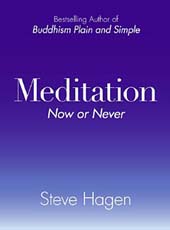"Constancy is the single most important factor in maintaining a meditation practice. If you find constancy in your practice, it's like throwing a switch that allows everything else to follow. Without it, there will be no understanding, no enlightenment.
"Meditating only now and then, when the urge arises or when you've had a stressful day and feel you need it, is like trying to boil water by turning on the stove for thirty seconds at a time, whenever you're in the mood. Unless the flame is constant, the water will never boil. Yet even a low flame, if maintained long enough, will do the job.
"Constancy means meditating no matter how we feel or what we think at the moment. We just go ahead and practice, no matter what.
"Without this attitude, we're just treating meditation the way we treat most everything else. Mentally and emotionally, it's just business as usual.
"In any moment, of course, we may lose our way or get distracted. But as soon as we remember, we come right back, take up this moment, and carry on — without giving another thought to having just slipped off. This is constancy.
"People new to meditation often misunderstand constancy. They think it's about not faltering, not losing your way or focus. But constancy is precisely about faltering, over and over, and coming back, over and over.
"With this understanding, we let ourselves be human, allow ourselves to err and to learn, and avoid getting discouraged about our meditation practice.
"So it's not that we never veer from the path, but that we waste no time in returning to it. No time for discussion. No time for excuses. Back to here and now.
"To establish constancy in your practice, it's essential that you set up some kind of regular meditation schedule. Just as creating a budget helps us with our finances, a regular schedule will help you with meditation.
"This schedule might be as simple as half an hour every morning just before breakfast. Or maybe it's twenty minutes at midday or twenty minutes before bed on workdays, thirty minutes each morning on weekends.
"It's best to meditate at precisely the same time every day. Building a regular schedule around meditation creates a solid and grounded daily routine that brings stability to your life and allows you to maintain a steady, ongoing practice. Making and keeping this regular appointment from day to day is to put your entire life in order.
"The most important thing to remember is to set a schedule that you can actually follow, not one you dream of following. Often when people first take up meditation, they are excited about it and overdo it, perhaps setting up a schedule that is too ambitious. This might work for awhile, even a few years, but if it's too much, it will only undo itself, and perhaps much of your life as well.
"Even if it's modest at first, it is far better to set up a schedule you can stick to without much difficulty. After you can maintain this schedule for a few months without missing any scheduled times, you can gradually increase the amount of time you devote to formal meditation practice. The key is to never waver from the schedule you set unless you are ill, or faced with an emergency, or some other unusual situation. As my teacher used to say, life is daily routine and unexpected occurrences. To live in constancy is to take care of both.
"The ideal schedule pushes you slightly, creates just a little internal resistance. This is good grist for the mill. Without some resistance, your practice will likely atrophy and die away; with too much, you may get discouraged and give up.
"As long as you stay with your schedule, the meditation practice will mature. Over time, you may increase the amount of time you spend in formal meditation. And as you continue to push gently against your resistance, your practice will gradually become more subtle and profound."
